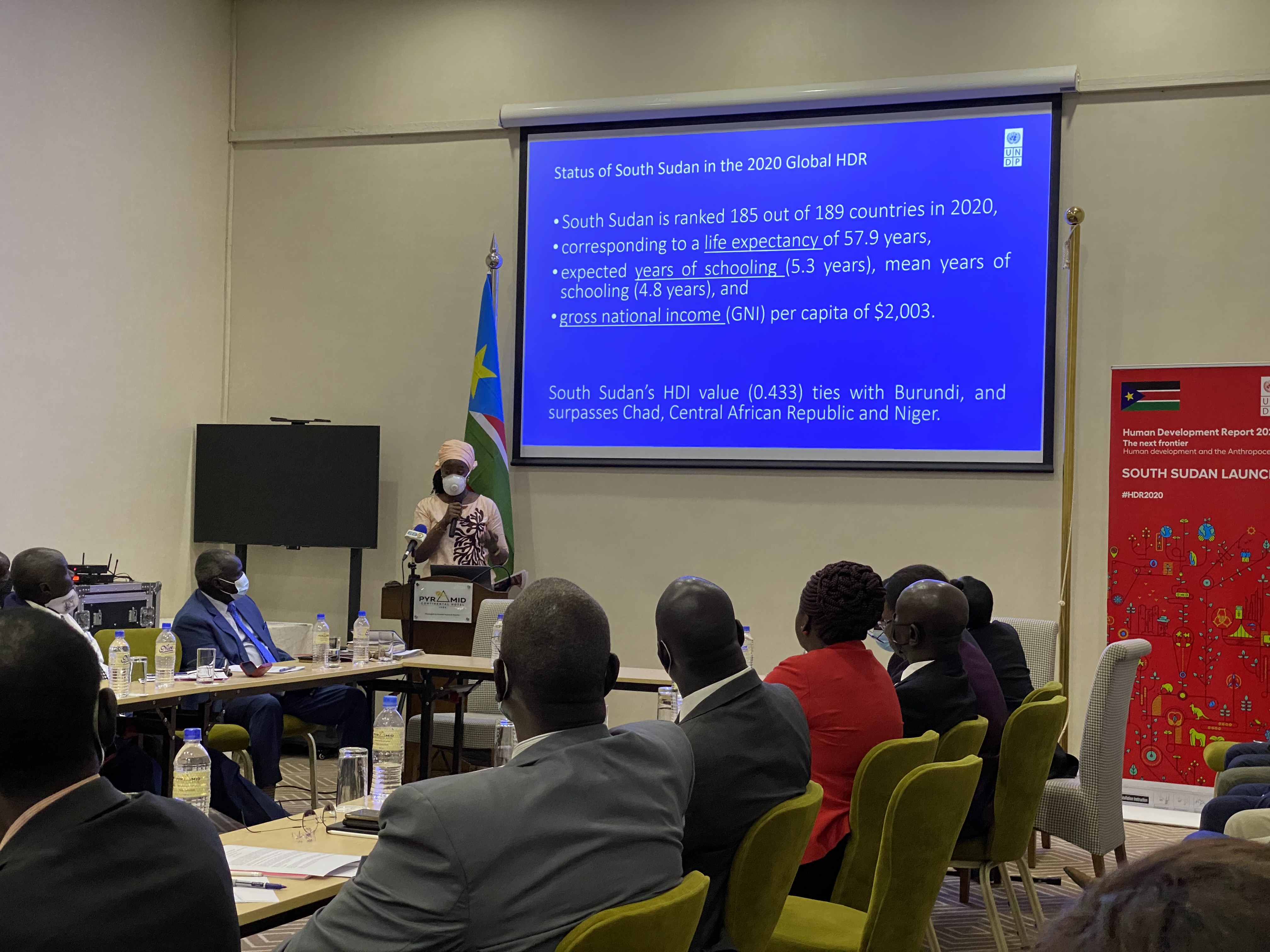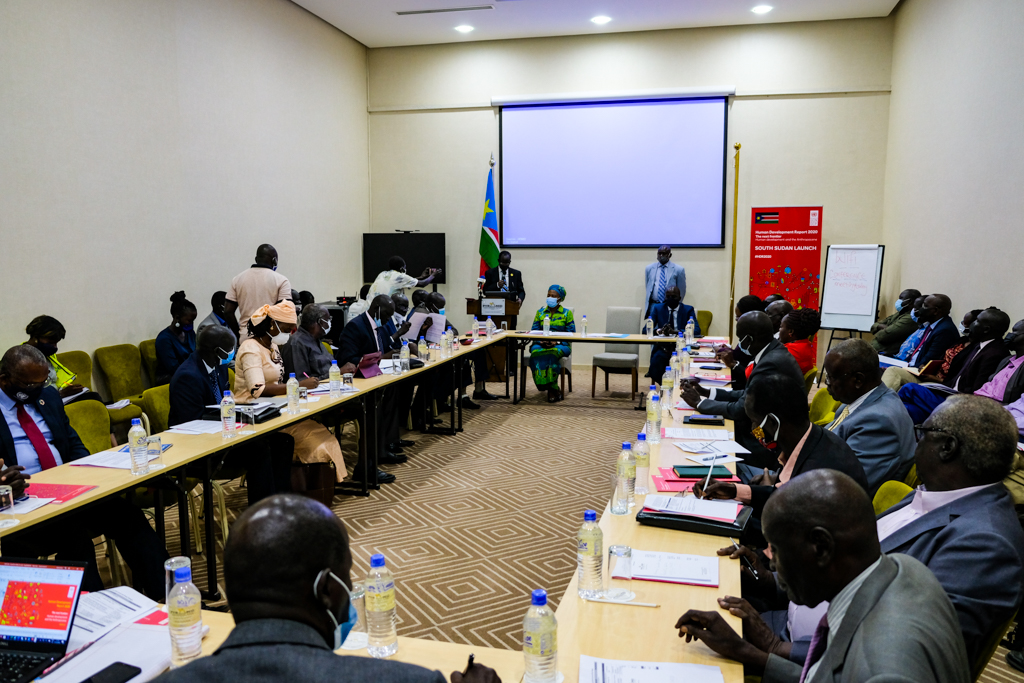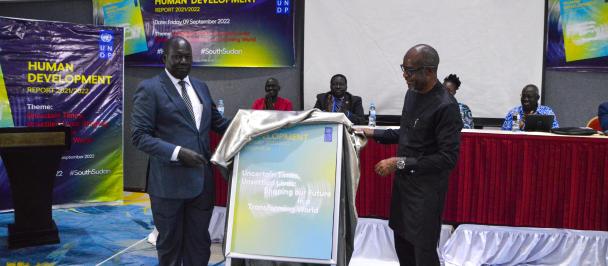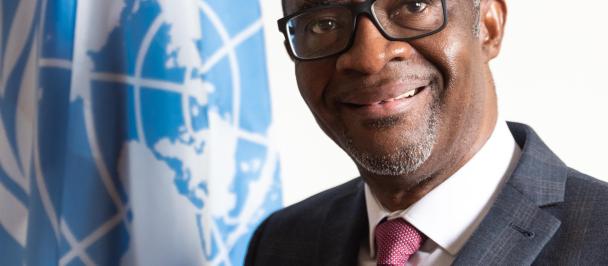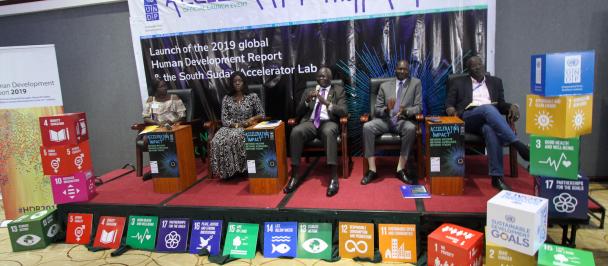Launch of the 2020 Human Development Report in South Sudan during the meeting of the Economic Cluster of the Revitalized Transitional Government of National Unity (RTGoNU) in Juba on 16 December 2020. Photo: UNDP
16 December 2020—In a year of unprecedented flooding, the Economic Cluster of the Revitalized Transitional Government of National Unity (RTGoNU) discussed urgent linkages between corruption, environmental protection, and increasing human development in South Sudan during the launch of the UNDP Global Human Development Report 2020.
His Excellency Vice President Prof. James Wani Igga, Chairman of the Economic Cluster of the RTGoNU, emphasized the need for national standardized accounting and monitoring systems to discourage unauthorized use of funds that negatively impact the government’s ability to efficiently implement policies that increase economic well-being and protect the planet.
The 30th anniversary of UNDP’s Human Development Report reflects the unprecedented times of COVID-19 coupled with wide-spread and extreme weather events. The report argues that humanity and the planet have entered an entirely new geological era, the Anthropocene or the “Age of Humans”. Instead of the planet shaping human beings, mankind itself has begun to influence the environment – often with major consequences.
“We are in an unprecedented moment in the history of our planet, with warning signs flashing red. But we have the choice to use human development to unlock the social, economic, and environmental transformations needed to rebalance our social and planetary systems, so that humans and the planet thrive together. This action calls for a holistic and integrated approach, addressing the economic, environmental and social dynamics of the threats we face in South Sudan,” said Christy Ahenkora, UNDP Resident Representative a.i..
In 2020, South Sudan has witnessed historic flooding, resource-based local conflict, and grappled with a regional locust invasion, in addition to widespread food insecurity and COVID-19 health and socio-economic impacts. New estimates project that by 2100, countries like South Sudan could experience up to 100 more days of extreme weather due to climate change each year.
“Sustainable development doesn’t mean that we must undermine our current needs [for human development] but means we must balance this with protecting the needs of future generations. In the next 50 years, South Sudan’s oil will be depleted. The forests and trees we cut down today, will be gone tomorrow. They don’t come back unless we act. Our substitutive rate needs to be equal to or more than our extractive rate,” said Nhial Tiitmamer, Director of the Environment and Natural Resources Program at the Sudd Institute and a part-time lecturer at the University of Juba.
In this new “Age of Humans” countries like South Sudan will need to redesign their paths to progress by fully accounting for the dangerous pressures humans put on the planet, and dismantle imbalances of power and opportunity that prevent change.
UNDP Economic Advisor Fatmata Lovetta Sesay gives a presentation on the 2020 Human Development Report and its economic policy implications for South Sudan for the ministerial-level Economic Cluster of the Revitalized Transitional Government of National Unity (RTGoNU) in Juba, South Sudan on 16 December 2020. Photo: UNDP
During the economic policy dialogue, which followed the launch of the report, the urgency of addressing corruption as a pathway to protecting South Sudan’s natural resources was highlighted. Six ministers and two deputies were present, including: Hon. Rizik Zachariah Hassan, Minister of Wildlife Conservation and Tourism; Hon. Dr. Dhieu Mathok, Minister of Investment; Hon. Onyoti Adingo, Minister of Animal Resources and Fisheries; Hon. Joseph Lagu, Minister of Agriculture and Food Security; Hon. Kuol Athian, Minister of Trade and Industry; Hon. Puot Kang, Minister of Petroleum; Hon. Lily Albino Akol, Deputy Minister for Agriculture and Food Security; and Hon. Agok Makur, Deputy Minister of Finance and Planning.
“Stewardship is what we are picking up on when we talk about corruption in relation to this Human Development Report. By reducing corruption, we can also address issues of environmental pressures,” said Dr. Lual Deng Achuek, Managing Director of the Ebony Centre for Strategic Studies.
The Human Development Report calculates and ranks the Human Development Index (HDI) of 189 countries annually. The HDI measures a nation’s health, education, and standards of living. The 2020 edition of the report adds two more elements: a country’s carbon dioxide emissions and its material footprint. This year’s index shows how the global development landscape would change if both the wellbeing of people and also the planet were central to defining humanity’s progress.
With the resulting Planetary-Pressures Adjusted HDI – or PHDI - a new global picture emerges, painting a less rosy but clearer assessment of human progress. For example, more than 50 countries drop out of the very high human development group, reflecting their dependence on fossil fuels and material footprint.
South Sudan is ranked 185 out of 189 countries in 2020, corresponding to a life expectancy of 57.9 years, expected years of schooling (5.3 years), mean years of schooling (4.8 years), and gross national income (GNI) per capita of $2,003. South Sudan’s HDI value (0.433) ties with Burundi, and surpasses Chad, Central African Republic and Niger. Norway, Ireland and Switzerland top the list with HDI values at or above 0.955.
##
For further information, please contact: Kymberly Bays, Head of Communications, kymberly.bays@undp.org, +211 920 580 239
To learn more about the 2020 Human Development report and UNDP’s analysis on the experimental Planetary Pressures-Adjusted HDI, visit http://hdr.undp.org/en/2020-report
His Excellency Vice President Prof. James Wani Igga, Chairman of the Economic Cluster, speaks at the launch of the 2020 Human Development Report in Juba, South Sudan on 16 December 2020. Photo: UNDP

 Locations
Locations
